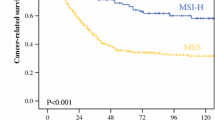Abstract
Background
In the decade after the 1945 atomic bombing of Hiroshima, a high incidence of leukemia was observed among atomic bomb survivors. However, the incidence of other cancers gradually increased, while that of leukemia decreased after this period. We evaluated the clinical outcome of early gastric cancer and microsatellite stability over a long-term period in atomic bomb survivors.
Methods
The results of surgical treatment for early gastric cancer were reviewed for 117 atomic bomb survivors and 394 control patients between 1995 and 2006. In addition, immunohistochemical staining for hMSH2 and hMLH1 expression was performed to evaluate the status of microsatellite stability in 57 atomic bomb survivors and 82 control patients.
Results
The long-term survival rate for early gastric cancer in atomic bomb survivors was significantly lower than that in control patients (p < 0.01). Multivariable analysis revealed that age and sex were significant and independent prognostic factors for early gastric cancer. Defective hMSH2 and/or hMLH1 expression was also significantly higher in survivors than in control patients (p < 0.001). Logistic regression analysis revealed that atomic bomb survivorship was related to defective hMSH2 and/or hMLH1 expression.
Conclusions
The prognosis of early gastric cancer in atomic bomb survivors was poor and was related to age and sex, rather than to being an atomic bomb survivor. Furthermore, a higher rate of defective hMSH2 and/or hMLH1 expression was observed in the survivors.



Similar content being viewed by others
References
Maloney WE, Kastenbaum MA. Leukemogenic effects of radiation in atomic bomb survivors in Hiroshima city. Science. 1995;121:308–9.
Kato H, Schull WJ. Studies of the mortality of A-bomb survivors. Radiat Res. 1982;90:32–395.
Nowell PC, Cole LJ, Ellis ME. Neoplasms of the glandular stomach in mice irradiated with X-rays or fast neutrons. Cancer Res. 1958;18:257–60.
Suehiro S, Nagasue N, Abe S, Ogawa Y, Sasaki Y. Carcinoma of the stomach in atomic bomb survivors; a comparison of clinicopathological features to the general population. Cancer. 1986;57:1894–8.
Yoshino K, Asanuma F, Hanatani Y, Otani Y, Kumai K, Ishibiki K. Multiple primary cancers in the stomach and another organ: frequency and the effects on prognosis. Jpn J Clin Oncol. 1985;15:183–90.
Yamamoto M, Yamanaka T, Baba H, Kakeji Y, Maehara Y. The postoperative recurrence and the occurrence of second primary carcinomas in patients with early gastric carcinoma. J Surg Oncol. 2008;97:231–5.
Yamamoto M, Taguchi K, Baba H, Endo K, Kohnoe S, Okamura T, et al. Loss of protein expression of hMLH1 and hMSH2 with double primary carcinomas of the stomach and colorectum. Oncol Rep. 2006;16:41–74.
Japanese Gastric Cancer Association. Japanese classification of gastric carcinoma. 2nd English edition. Gastric Cancer. 1998;1:10–24.
Warren S, Gates O. Multiple primary malignant tumors. Am J Cancer. 1932;16:1358–414.
Cox DR. Regression models and life tables. J R Stat Soc B. 1972;35:187–220.
Yamamoto M, Matsuyama A, Kameyama T, Okamoto M, Okazaki J, Utsunomiya T, et al. The long-term outcome of atomic bomb survivors with gastric carcinoma. J Surg Oncol. 2009;100:594–7.
Maruta K, Shida H. Some factors which influence prognosis after surgery for advanced gastric cancer. Ann Surg. 1968;167:313–8.
Kamada N, Uchino H. Preleukemic status in atomic bomb survivors in Japan. Blood Cell. 1976;345–7.
Beebe GW, Kato H, Land CC. Studies of mortality of A-bomb survivors. Radiat Res. 1978;75:138–201.
Ito C, Hasegawa K, Kumazawa T. Incidence of gastric cancer in atomic bomb survivors residing in the Hiroshima area. Hiroshima J Med Sci. 1984;33:47–52.
Nakashima M, Kondo H, Miura S, Soda M, Hayashi T, Matsuo T, et al. Incidence of multiple primary cancers in Nagasaki atomic bomb survivors: association with radiation exposure. Cancer Sci. 2008;99:87–92.
Gryfe R, Kim H, Hsieh ET, Aronson MD, Holowaty EJ, Bull SB, et al. Tumor microsatellite instability and clinical outcome in young patients with colorectal cancer. N Engl J Med. 2000;342:69–77.
Liang JT, Huang KC, Cheng AL, Jung YM, Wu MS, Wang SM. Clinicopathological and molecular biological features of colorectal cancer in patients less than 40 years of age. Br J Surg. 2003;90:205–14.
Jass JR, Walsh MD, Barker M, Simms LA, Young J, Leggett BA. Distinction between familial and sponradic forms of colorectal cancer showing DNA microsatellite instability. Eur J Cancer. 2002;139:347–56.
Beghehi S, de Manzoni G, Barbi S, Tomezzoli A, Roviello F, Di Gregorio C, et al. Microsatellite instability in gastric cancer is associated with better prognosis in only stage II cancers. Surgery. 2006;139:347–56.
dos Santos NR, Seruca R, Constância M, Seixas M, Sobrinho-Simões M. Microsatellite instability at multiple loci in gastric carcinoma: clinicopathologic implications and prognosis. Gastroenterology. 1996;110:38–44.
Author information
Authors and Affiliations
Corresponding author
Rights and permissions
About this article
Cite this article
Yamamoto, M., Taguchi, K., Yamanaka, T. et al. Outcome and Status of Microsatellite Stability in Japanese Atomic Bomb Survivors with Early Gastric Carcinoma. Ann Surg Oncol 20, 798–803 (2013). https://doi.org/10.1245/s10434-012-2567-0
Received:
Published:
Issue Date:
DOI: https://doi.org/10.1245/s10434-012-2567-0




